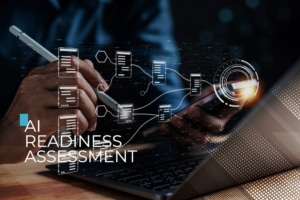AI Readiness Assessment
5 Signs Your Milwaukee Business is Ready for AI Automation
Years in Business
Completed Projects

Milwaukee Web Design helps regional businesses navigate these assessments through strategic technology consulting and implementation services. Companies that conduct thorough readiness evaluations position themselves for measurable returns while avoiding costly deployment mistakes. The assessment process examines six key pillars including strategy alignment, infrastructure capabilities, data quality, governance frameworks, talent resources, and organizational culture.
Business leaders who prioritize systematic evaluation achieve higher success rates and better return on investment compared to organizations that rush into AI implementation without proper preparation.
Recent industry research reveals a stark disconnect between AI urgency and organizational preparedness across American enterprises. Only 13% of companies globally are fully ready to capture AI’s potential, representing a decline from 14% in the previous year despite increasing investment and deployment pressure.
Seventy-one percent of organizations regularly use generative AI in at least one business function, up from 65% in early 2024, yet close to half report that AI implementations have fallen short of expectations across top priorities. Wisconsin AI readiness mirrors these national trends with similar preparation challenges.
Manufacturing companies show particularly mixed results, with 77% implementing some form of AI yet struggling with systematic deployment across operations. The research demonstrates that organizations with mature AI capabilities are 10 times more likely to feel fully prepared for enterprise-wide deployment by 2026, highlighting the critical importance of comprehensive readiness evaluation.
Effective AI maturity evaluation requires systematic analysis across multiple organizational dimensions that determine implementation success and sustainability. The most comprehensive frameworks examine strategy alignment, where organizations must clearly define AI objectives that support core business goals and ensure executive leadership commitment for long-term vision development. Infrastructure readiness encompasses computational capabilities, network performance, cybersecurity measures, and scalable cloud architecture needed to support AI workloads effectively.
Strategic AI marketing implementation becomes increasingly important as businesses integrate artificial intelligence across customer-facing operations. Data quality and governance represent critical foundation elements, as 80% of organizations report inconsistencies or shortcomings in data preprocessing and cleaning for AI projects. Talent capabilities involve both technical expertise and change management skills needed to drive adoption throughout the organization. Cultural readiness measures the organization’s willingness to embrace AI-driven decision making and adapt established workflows to incorporate intelligent automation.
Successful AI implementation requires structured approach that addresses technical requirements, organizational readiness, and strategic alignment through systematic evaluation processes. The implementation checklist begins with comprehensive data audit to identify quality issues, integration challenges, and governance gaps that could derail AI initiatives.
Organizations must establish clear metrics for measuring AI performance, including both technical accuracy and business impact indicators across relevant departments and functions. Advanced web development capabilities support AI integration by creating digital platforms that effectively leverage machine learning algorithms and automation tools. Infrastructure assessment covers computational resources, network bandwidth, security protocols, and scalability requirements needed to support AI workloads at enterprise scale.
Talent evaluation examines current team capabilities, identifies skill gaps, and develops training programs to ensure successful technology adoption. Governance framework development includes ethical guidelines, risk management protocols, and compliance requirements specific to the organization’s industry and regulatory environment.
Southeast Wisconsin businesses face unique opportunities to leverage AI readiness assessments for competitive advantage in manufacturing, healthcare, and financial services sectors. Milwaukee’s position as a manufacturing hub creates specific AI applications including predictive maintenance, quality control automation, and supply chain optimization that require targeted readiness evaluation approaches.

The region’s collaborative business environment, combined with university partnerships and Microsoft’s $3.3 billion AI investment, provides unique resources for comprehensive readiness assessment and implementation support. Companies that conduct thorough evaluations and implement systematic deployment strategies capture first-mover advantages in their respective markets while competitors struggle with ad-hoc AI initiatives.
Maximizing AI readiness assessment value requires ongoing evaluation, strategic iteration, and continuous improvement processes that align with evolving business objectives and technological capabilities. Organizations should establish regular assessment cycles that track progress across all maturity dimensions, identify emerging gaps, and adjust implementation strategies based on performance data and market conditions.
The optimization process includes benchmarking against industry standards, analyzing competitor AI capabilities, and identifying opportunities for differentiation through advanced applications. Companies must develop internal expertise for conducting assessments, interpreting results, and translating findings into actionable improvement plans that drive measurable business outcomes. Change management becomes critical as organizations transition from assessment to implementation, requiring comprehensive communication strategies, employee training programs, and stakeholder alignment initiatives.
The window for achieving competitive advantages through systematic AI readiness evaluation is narrowing rapidly, making immediate action essential for Milwaukee businesses seeking market leadership. Leading business publications consistently emphasize the importance of structured readiness assessment for sustainable AI implementation success and long-term competitive advantage.
An AI readiness assessment evaluates an organization’s preparedness to deploy artificial intelligence across six key pillars: strategy, infrastructure, data, governance, talent, and culture. It identifies gaps and creates implementation roadmaps for successful AI adoption.
Research shows 85% of companies believe they have less than 18 months to deploy AI strategies or face negative business effects. This urgency stems from competitive pressure and the transformative potential of AI technologies.
Comprehensive assessments typically require 2-4 weeks depending on organization size and complexity. The process includes stakeholder interviews, technical evaluations, data audits, and collaborative workshops to develop actionable roadmaps.
Only 13% of organizations globally are fully prepared to leverage AI’s potential, down from 14% the previous year. This highlights the critical gap between AI urgency and actual organizational readiness.
Priority areas include data quality and governance (80% report issues), infrastructure capabilities, cybersecurity readiness (42% achieve advanced deployment), and talent development for successful AI implementation.
Best practices recommend annual comprehensive assessments with quarterly progress reviews. The rapid evolution of AI technologies and organizational capabilities requires regular evaluation to maintain competitive advantages and implementation success.
The evidence overwhelmingly supports immediate action on comprehensive AI readiness assessment for Southeast Wisconsin businesses across all industries and organizational sizes. With 98% of organizations feeling urgent pressure to deploy AI strategies and only 13% currently prepared for successful implementation, the gap between necessity and readiness creates both significant risk and tremendous opportunity.
Companies that invest in systematic evaluation processes, develop comprehensive implementation roadmaps, and build organizational capabilities position themselves for sustainable competitive advantages in an increasingly AI-driven marketplace.
The combination of structured assessment frameworks, regional support resources, and proven implementation methodologies provides clear pathways to AI success for businesses willing to prioritize strategic preparation over rushed deployment initiatives.
Web services are more than just website creation. They involve strategically crafting an experience that engages users, builds credibility, and turns your target audience into loyal customers.
Marketing goes beyond promoting products—it’s about telling a powerful brand story that builds trust, nurtures community, and drives meaningful business growth.
Book your no-obligation strategy session today and receive a complimentary custom homepage design. Limited to just 5 spots per month—reserve yours before they’re gone.

